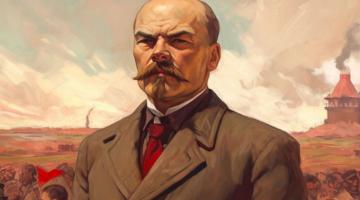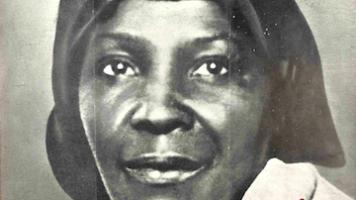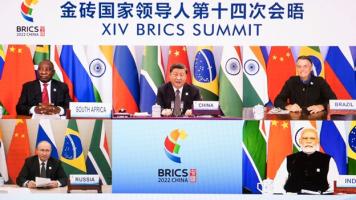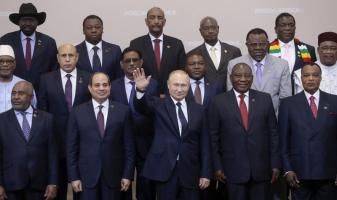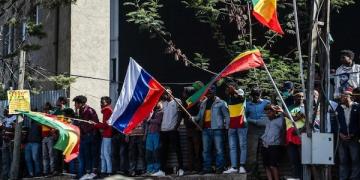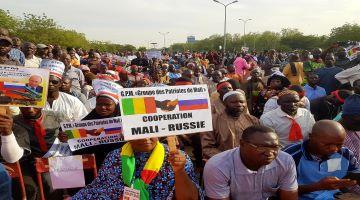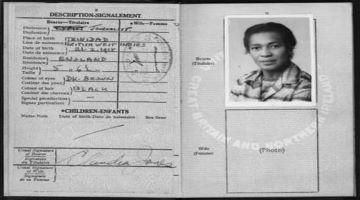Protest against Emmanuel Macron in Kinshasa, DRC, 2023. (Photo: ARSENE MPIANA/AFP/GETTY IMAGES)
The Soviet Union's support of liberation movements and the activism of the Communist Party in the U.S. is not forgotten by the African diaspora. Today the Russian Federation is a beneficiary of good will generated decades ago.
On the first week of spring in 1931, at the nadir of the Great Depression, nine Black teenagers stowed away on a Memphis-bound train scuffled with a gaggle of white youths who took exception to their presence. The Black youths made quick work of their counterparts, heaving all but one, Orville Gilley, from the slow-moving railcars to the grassy knoll below. Gilley would have met the same fate as his friends but by the time the Black youths got to him, the train had picked up considerable speed, and he was hanging perilously from the gondola. Fearing Gilley might fall underneath one of the railcars, two Black teenagers pulled him back to safety and stood down.
Forty miles down the tracks, near Paint Rock, Alabama, the train began to slow again. When a couple of the Black youths peeked outside as the train rolled to a stop, they were shocked to see two sheriff's deputies and a phalanx of white men armed with rifles, pistols, and shotguns rushing towards them. The posse snatched up the African American teens, arrested them on charges of vagrancy and assault, tied them to one another with a plow line, herded them onto the back of a flatbed truck, and drove them to the jail in the county seat of Scottsboro, 21 miles east of Paint Rock. Later, after pressuring two white sex workers aboard the train, authorities would add another charge:
Rape.
Sixty miles away in Chattanooga, the editor of the communist organ, the Southern Worker, heard of the arrests on the radio that evening. Born Solomon Auerbach in 1906 and raised in a Jewish immigrant neighborhood of Philadelphia, James Allen had joined the Communist Party USA in 1928 and was teaching philosophy at the University of Pennsylvania when his handlers asked him two years later to launch the party’s first newspaper in the South. He initially tried Birmingham but soured quickly after discovering that the town was so hot that Party organizers were forced to move as often as three times in a single month to keep ahead of the Klan and the sheriff’s Red squad. He settled instead on the slightly more progressive Chattanooga just across the Tennessee state line and home to the publishing empire of the Adolph Ochs family that owned the New York Times. Allen’s wife, Ida Kleinman, joined him as Isabele Allen a few weeks later, and the couple rented a small apartment for both home and office, traveling light, with only their personal effects, a small, portable typewriter, some boxes and books, so they could pack up and move at a moments’ notice if need-be. They found a printer six miles away across the Georgia state line in Rossville who agreed to print 3,000 copies a week for $60 cash.
Using a Birmingham dateline to throw police off his trail, the inaugural issue of the Southern Worker was published on August 16, 1930, calling for “full social, economic and political equality for Negro workers and farmers,” in an editorial entitled “What Do We Stand For?” The Birmingham police reportedly raided every known communist hangout in the city searching for “Jim Allen.”
Later, when the Allens learned that law enforcement had barely thwarted a lynch mob of nearly 100 whites who had swarmed the Scottsboro jail, the couple wired the New York office of the Communist Party’s legal arm, the International Legal Defense. The ILD, as it was known, sent their southern representative, Lowell Wakefield, and a top Black organizer, Doug McKenzie to Scottsboro, where they met up with Isabelle Allen. McKenzie was the first to report that Price and Bates were sex workers, and Allen, writing under the pseudonym Helen Marcy, humanized the defendants through interviews with their parents. Characterizing the case as a “crude frame-up,” the articles in the Southern Worker called for mass protests almost from the start, contrasting sharply with the opprobrium heaped upon the youths by the mainstream national press corps.
Among those reading the Southern Worker’s dispatches was Walter White, the 37-year-old secretary of the National Association for the Advancement of Colored People, founded in 1909 by white social reformers and Black intellectuals. While he privately expressed doubts about the youths’ guilt, the ambitious White was new to his job and reticent to antagonize either his biracial executive board or the bourgeois donors of all races who he was relying on to keep the reformist civil rights organization afloat in the Depression. His statement read in part:
“The N.A.A.C.P. is not an organization to defend Black criminals. We are not in the field to condone rape, murder and theft because it is done by Black men. … When we hear that eight colored men have raped two white girls in Alabama, we are not first in the field to defend them. If they are guilty and have a fair trial the case is none of our business.”
At the time of the Scottsboro case, the Communist Party in the U.S. was actively scouring the country for a narrative that improved upon their didactic pamphlets, glib sloganeering and nationwide chain of newspapers that were popular but fell short of activating a proletarian uprising.
Following the formulation of the Soviet Union, Vladimir Lenin envisioned an international workers’ uprising and recognized that African independence movements would, by necessity, have to play a vanguard role in any such movement if it was to be successful.
Between its opening in 1921 and dissolution at the advent of World War II, Moscow’s Communist University of the Toilers of the East–known by the Russian acronym KUTVA– enrolled scores of revolutionaries –including Ho Chi Minh, Deng Xiaoping, Jomo Kenyatta, and African Americans such as Harry Haywood, Jane Golden, and one of Paul Robeson’s best friends, the lawyer William Patterson – to pore over Marxist texts and study organizing strategies.
At the 6th Congress of the Soviet-led Communist International, or COMINTERN, the assembly proclaimed in 1928:
"It is essential for the Communist Party to make an energetic beginning now-at the present moment-with the organization of joint mass struggles of white and black workers against Negro oppression. This alone will enable us to get rid of the bourgeois white chauvinism which is polluting the ranks of the white workers in America, to overcome the distrust of the Negro masses caused by the inhuman barbarous Negro slave traffic still carried on by the American bourgeoisie-in as much as it is directed even against all white workers-and to win over to our side these millions of Negroes as active fellow-fighters in the struggle for the overthrow of bourgeois power throughout America."
When the NAACP backpedaled, the CPUSA ran full speed towards the conflagration. Harry Haywood, a Black waiter who had just returned stateside after three years of language training and political education courses in Moscow, recalled another African American party organizer, Sol Harper, accusing the NAACP of selling the nine teenagers out. “We have to step in now,” Harper said to his colleagues in the Harlem office. “We must take over the legal defense. Send our lawyers down and get them to line up the boys and their parents.”
After meeting with the International Legal Defense, a plan came together. Wakefield wired Alabama’s governor to request a stay of execution, which was granted immediately. The ILD’s chief lawyer, Joseph Brodsky, and an associate traveled to Birmingham and Chattanooga to meet with the parents while a local ILD attorney, Allen Taub, traveled to Kilby State Prison outside Montgomery to meet with their sons. By April 10, the day of sentencing, virtually all of the defendants had agreed to allow the communists to represent them on appeal. That same day, the Central Committee published a statement in the Daily Worker referring to the case as a “courthouse lynching” carried out by the “Southern white ruling class.” The statement called upon “all working-class and Negro organizations to adopt strong resolutions of protest and to wire these to the Governor of Alabama.” Those resolutions alone, however, “will do no good; you must organize such at greatest possible speed mass meetings and militant mass demonstrations against this crime.” In conclusion, the communique blared, “Death penalty for lynchers!” and “Stop the legal lynching at Scottsboro!” Two days later, nearly 1,300 workers demonstrated in Cleveland to protest the verdicts, 20,000 attended a rally the next day in New York City, followed by massive demonstrations in Philadelphia, Milwaukee, Omaha, Sioux City, Kansas City, Boston, Buffalo, Niagara Falls, New Haven, and Elizabeth, New Jersey.
By coming to the aid of the Scottsboro boys, the Soviet Union provided the spark for the New Deal, the civil rights and Black Power movements, and the Cold War, and assigned indelibly to the Russians the role of both “nigger lovers” and implacable foe to settler colonialism around the world. The Soviet Union’s support for Black liberation movements began to wane from virtually the moment that Lenin died in 1924, and weakened dramatically under Stalin to the point that many African American communists would abandon Soviet-style Marxism for ideologies that more expressly addressed racial capitalism rather than merely capitalism. The bank of goodwill accumulated over the course of its 70 years in existence has earned the Russian Federation broad respect from both African Americans and Africans who prefer the country to the West by a wide margin.
Africans on the continent especially remember the Soviet Union’s support for South Africa’s anti-apartheid movement—led by Nelson Mandela’s African National Congress—and guerilla fighters in several African countries. In March, Julius Malema, the leader of a South African opposition party, the Economic Freedom Fighters, said that the country, whose anti-apartheid movement had close ties to Russia, would not even consider arresting Putin for war crimes if he attends a BRICS summit in Capetown next month. Said Malema:
If need be, we will go and fetch him from the airport to his meeting, he will address, finish all his meetings, we will take him back to the airport. We are not going to be told by these hypocrites of the [International Criminal Court] who know the real violators of human rights, who know the murders of this world.
Malema’s reference was to former British Prime Minister Tony Blair and former President George W. Bush, who invaded Iraq, and Barack Obama, who destroyed Libya, the most prosperous country on the African continent, and was responsible for the murder of Libya’s Muammar Gaddafi, a strong pan-Africanist who was remarkably popular among Africans.
And here in the U.S., 21 percent of African Americans support sending American troops to Ukraine, according to a 2022 poll by the Carnegie Center for International Peace, or slightly more than half of the 38 percent of all Americans who support boots on the ground in Ukraine, according to a separate Center survey.
The lack of support from the Black community runs counter to the bevy of African American elites–including Secretary of Defense Lloyd Austin, the U.S. Ambassador to the United Nations, Linda Thomas Greenfield, Washington Post columnist Eugene Robinson–who have parroted the Biden administration’s rhetorical attacks 0n Russian President Vladimir Putin. Earlier this year, Dr. Wilmer Leon, host of a popular public affairs radio show, Inside the Issues, broadcast nationally on Sirius XM, sued Hampton University for rescinding a job offer to join the faculty; court documents allege that his political views on Ukraine led to the reversal.
Similarly, when Hampton University last year announced their decision to allow Ukrainians affected by the war to attend the historically black institution tuition free, social media erupted. Read one tweet:
Tomorrow, every person who cares about the safety of black students at #hamptonuniversity need to call Dr. Harvey office and demand they rescind this offer immediately or the alumni will not give back or attend homecoming this year! #hampton #blacktwitterhttps://t.co/bULPoz16NX
— Nuri Amira J. (@NuriAmiraJ) March 17, 2022
And another:
Hampton University’s priorities are out of order. Free room and board for students from Ukraine ??? We got a 200 dollar book stipend… no iPads. Mold and cold water in the dorms. God knows what’s in that cafe food.I pray some better leadership comes as Harvey makes his exit.
— Naomi (@zoeynaomii) March 18, 2022
In April, a federal grand jury charged the longtime African American activist, Omali Yeshitela, and two other members of the African Socialist People’s Party with acting as agents of the Russian government. Yeshitela has called the charges ridiculous and said that he was only exercising his organization’s right to organize and to speak freely, as Americans are said to have a right to do.
These tensions within the Black community mirror those that divided the African American working class from the NAACP’s Black elite, whose virulent anti-communism was often in vocal opposition to grassroots activism and labor organizing in the Black community.
The communists’ efforts in Scottsboro left an impression on the African American masses. “There is no group in America,” the iconic Harlem Congressman Adam Clayton Powell Jr. wrote in 1945, “which practices racial brotherhood one-tenth as much as the Communist Party.”
Such tributes earned the Reds the enmity of the NAACP’s White, who viewed the Communists both as a threat to his organization’s prestige and a band of merry lunatics who were perfectly willing to sacrifice black folks on their utopian, red altar. While privately disparaging the Scottsboro mothers as hayseeds, the NAACP continued to solicit the defendants and their families to take over their defense. None did. In 1932, Claude Patterson wrote to his son in prison: “You will burn sure if you don’t let those preachers alone and trust in the International Labor Defense handle the case.”
The ILD would ultimately see all nine Scottsoboro defendants either freed or exonerated. Said Clarence Norris, the last of the Scottsboro Boys to be freed:
I believe the spotlight the Reds put on Alabama saved all our lives.
A former foreign correspondent for the Washington Post, John Jeter is the author of Flat Broke in the Free Market: How Globalization Fleeced Working People and the upcoming Class War in America: How the Elites Divided the Nation by Asking Are You a Worker or Are You White?

